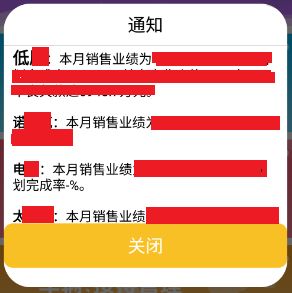嗨,各位,今天来个小技巧,估计很多人都知道,我也就重复提下罢了。。
比如
我们看到,我用红框框出来的地方
1.直接使用系统自带的AlertDialog的提示框,我们看到了我们更新提示里面的具体内容是(-Bug修改 -新增更新提示);并且换行了。
2.是自定义的弹框,(自定义弹框用的是我自己封装的类:项目需求讨论-Android 自定义Dialog实现步骤及封装),我们看到里面的内容会有各种排版,有些是黑色加粗,有些是换行。有些字体可能颜色不同突出明显,等等需求。
归结
归结起来,我们不可能是好几个TextView,然后去自己一个段落一个TextView去呈现,一般都是跟后台约定好,让他传过来HTML格式的字符串
所以1.里面我们就是
AlertDialog.Builder builder = new AlertDialog.Builder(activity);
builder.setMessage(Html.fromHtml(info.getChangeLog()));
2.里面我们是
TextView message = (TextView) view.findViewById(R.id.message);
if(!TextUtils.isEmpty(content)){
message.setText(Html.fromHtml(content));
}
所以后台传过来的时候,就是可能是这种
{"content":"低**:本月销售业绩。
诺**:本月销售业"}
然后我们就一个TextView就可以呈现不同的格式的内容。只要用Html.fromHtml(String);先转一下,再赋给TextView即可。
老司机这就完了?????
答案当然是No。
你会发现Html.fromHtml(String message)这个方法画了横线,已经过时了。WHF。那应该用什么。
@SuppressWarnings("deprecation")
public static Spanned fromHtml(String html){
Spanned result;
if (android.os.Build.VERSION.SDK_INT >= android.os.Build.VERSION_CODES.N) {
result = Html.fromHtml(html,Html.FROM_HTML_MODE_LEGACY);
} else {
result = Html.fromHtml(html);
}
return result;
}
我们在Android 6 及以下,还是使用Html.fromHtml(String);而在Android 7 及以上要用新的:Html.fromHtml(String , flags);
这个Config分为哪些呢:
官方链接走起:Html class documentation
flags有这些:
public static final int FROM_HTML_MODE_COMPACT = 63;
public static final int FROM_HTML_MODE_LEGACY = 0;
public static final int FROM_HTML_OPTION_USE_CSS_COLORS = 256;
public static final int FROM_HTML_SEPARATOR_LINE_BREAK_BLOCKQUOTE = 32;
public static final int FROM_HTML_SEPARATOR_LINE_BREAK_DIV = 16;
public static final int FROM_HTML_SEPARATOR_LINE_BREAK_HEADING = 2;
public static final int FROM_HTML_SEPARATOR_LINE_BREAK_LIST = 8;
public static final int FROM_HTML_SEPARATOR_LINE_BREAK_LIST_ITEM = 4;
public static final int FROM_HTML_SEPARATOR_LINE_BREAK_PARAGRAPH = 1;
public static final int TO_HTML_PARAGRAPH_LINES_CONSECUTIVE = 0;
public static final int TO_HTML_PARAGRAPH_LINES_INDIVIDUAL = 1;
看了还是不懂,没关系。效果图放出来:
This is a paragraph with a style
Heading H4
-
li orange element
- li #2 element
This is a blockquote
Text after blockquote
Text before div
This is a div
Text after div
不同Config的情况下显示的Html格式的文字呈现效果。
继续放招
我们用如下代码:
String message = "低**:本月销售业绩。
诺**:本月销售业";
textView.setText(Html.fromHtml(message));
OK,没问题。我们知道会出来我们上面的自定义提示框的格式。
但是我们如果是
textView.setText(Html.fromHtml(message)+"");
没错,我们把Html.fromHtml(message)和字符串拼接之后,再传给TextView,那么那些,等标签就无效了。
所以我们如果有需求要拼接字符串,一定要先把要拼接的字符串拼接完后,再用Html.fromHtml包裹,然后赋值给TextView。
有些人说我的字符串不是在代码中,而是在strings.xml中定义,但是直接XML中的
标签里面定义很多其他标签:......。在低版本的Android设备可能会直接忽略这些标签,这时候我们可以使用,这个标记所包含的内容将表示为纯文本。
比如:有颜色的文字
换一行显示
再换一行显示]]>
老司机最后一招
大家都知道,Html格式中改变字体大小的是但是你会发现:
String htmlText = ""+productName+"
"
+ "积分:"
+ "+"+productPoint+"分";
TextView tv = (TextView)findViewById(R.id.productNameAndPoint);
tv.setText(Html.fromHtml(htmlText));
我们的颜色的设置是有效的,但是却无效。
解决方法:
1.如果项目的字体大小要求不是很精致,只是单纯的为了标题突出等,可以用我们上面的,,等
2.我们自定义标签。思路是替换font标签自己解析设置。用到的接口是Html类TagHandler接口:
public class DdbFontHandler implements TagHandler {
private int startIndex = 0;
private int stopIndex = 0;
@Override
public void handleTag(boolean opening, String tag, Editable output,
XMLReader xmlReader) {
processAttributes(xmlReader);
if(tag.equalsIgnoreCase("ddbfont")){
if(opening){
startFont(tag, output, xmlReader);
}else{
endFont(tag, output, xmlReader);
}
}
}
public void startFont(String tag, Editable output, XMLReader xmlReader) {
startIndex = output.length();
}
public void endFont(String tag, Editable output, XMLReader xmlReader){
stopIndex = output.length();
String color = attributes.get("color");
String size = attributes.get("size");
size = size.split("px")[0];
if(!TextUtils.isEmpty(color) && !TextUtils.isEmpty(size)){
output.setSpan(new ForegroundColorSpan(Color.parseColor(color)), startIndex, stopIndex, Spanned.SPAN_EXCLUSIVE_EXCLUSIVE);
output.setSpan(new AbsoluteSizeSpan(Utils.dipToPx(GApp.instance(), Integer.parseInt(size))), startIndex, stopIndex, Spanned.SPAN_EXCLUSIVE_EXCLUSIVE);
}else{
output.setSpan(new ForegroundColorSpan(0xff2b2b2b), startIndex, stopIndex, Spanned.SPAN_EXCLUSIVE_EXCLUSIVE);
}
}
final HashMap attributes = new HashMap();
private void processAttributes(final XMLReader xmlReader) {
try {
Field elementField = xmlReader.getClass().getDeclaredField("theNewElement");
elementField.setAccessible(true);
Object element = elementField.get(xmlReader);
Field attsField = element.getClass().getDeclaredField("theAtts");
attsField.setAccessible(true);
Object atts = attsField.get(element);
Field dataField = atts.getClass().getDeclaredField("data");
dataField.setAccessible(true);
String[] data = (String[])dataField.get(atts);
Field lengthField = atts.getClass().getDeclaredField("length");
lengthField.setAccessible(true);
int len = (Integer)lengthField.get(atts);
/**
* MSH: Look for supported attributes and add to hash map.
* This is as tight as things can get :)
* The data index is "just" where the keys and values are stored.
*/
for(int i = 0; i < len; i++)
attributes.put(data[i * 5 + 1], data[i * 5 + 4]);
}
catch (Exception e) {
}
}
}
还有超链接等其他的HTML标签的实现:
请参考:Html类TagHandler接口
哪里错了希望大家用力喷我!!! O(∩_∩)O哈哈~



